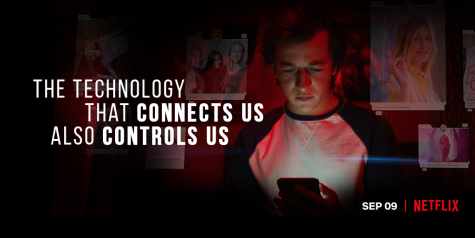“The Social Dilemma” Reviewed: A Warning Call to Humanity
The Message Behind Netflix’s 2020 Documentary
November 2, 2020
Jeff Orlowski’s eye-opening 2020 documentary The Social Dilemma sounds the alarm on the ethical issues plaguing the tech industry, forcing everyday people to truly consider how much control they have over their digital lives.
First released this January on Netflix, the documentary has caught the attention of the world as a shocking exposé on the immense power social media platforms have over their users. Told from the perspective of former Giant Tech employees, the storyline of the documentary cuts between interviews and a parallel skit of an average family who slowly becomes controlled by the technology they possess.
The documentary has many unforgettable quotes like this one. It presents the argument that what tech companies are doing is “trading in human futures.” The users are the product. The goal of social media companies is user engagement. Longer engagement time means users will see more ads, and more ads mean more money for companies. If they can make a small shift in changing what you do and who you are, they have won. By using collected data from how long you look at content on your screen, they can build digital models that predict your actions. These digital models allow them to generate personalized feeds that display targeted ads for products they believe you are more likely to click on.
Of course, such innovation does not happen automatically. Social media platforms run what experts call growth hacking to experiment with their users, frequently sending out different content to individual feeds in hopes of finding a more efficient method to increase engagement.
“Fundamentally, humans don’t change technology does.” For so long, humans have been scared of a future where AI humanoids rule the world. What The Social Dilemma reveals is that this scary technological future may already be upon us in hidden ways we had not considered. Among a recent survey of the BCA community, three-fourths of respondents agree that their apps can predict the content they are interested in decently well, with a quarter of them also admitting they are addicted to their phones.

This current generation of children has a closer relationship to technology and social media than ever before. AAST Sophomore Artem Ivaniuk describes it. “Our generation is slowly being overwhelmed by it [social media].” Now, these same children with access to revolutionary technology are also growing up more anxious and depressed than ever before. Artem mentions the stigma amongst Gen Z that labels “many people … antisocial if they don’t have social media accounts and are not active there.”
The Social Dilemma is a film calling for accountability. With power comes great responsibility. Tech companies owe their users certain protections, especially when many of their users are in their adolescence. Not only are tech employees concerned about the direction the tech industry is taking but so are two-thirds of the BCA survey participants.
The future of the tech industry is now in the hands of young and aspiring computer science students like ATCS Sophomore Christina Kaddouh. Technological innovation is progressing exponentially. Christina believes it should not have to slow down. At the same time, many tech experts are worried that the speed at which innovation is progressing at poses to the tech industry a very crucial question: are they willing to leave ethics behind to keep up? Christina reveals the cold hard truth. “The fact that companies take advantage of innovation to essentially buy consumers’ attention is pretty much an inevitable side effect.”
On every coin, there are two sides. As explained in The Social Dilemma interview with Tristan Harris, a former Google employee and co-founder of the Center for Humane Technology, technology is “confusing because it’s simultaneous utopia and dystopia.”
Tech experts in the documentary make it clear that social media never started out wanting to be something harmful. Ideas like the Facebook like button were created to “spread positivity and love in the world” as stated by its designer Justin Rosenstein. Yet they never anticipated the side effect of how likes impact self-confidence and can cause anxiety as users religiously watch over their screen for the number of likes they receive on a post.
Although it is easy to see The Social Dilemma as a warning message towards the doom of humanity to fall into a world where no one is safe amongst their technology, the interviewed experts stress that they are not suggesting to cut ties with all tech. The documentary serves to make its viewers aware of what happens behind the curtain of the social media platforms we crave so much.
It is unfair to state that all technology is all bad. There exists the negatives as well as the positives. The Social Dilemma serves as a guide to make you aware of when social media platforms are tricking you.





